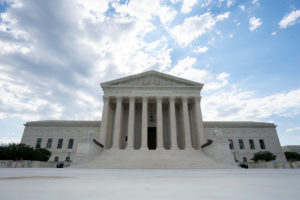
In dealing with the justices on America’s highest court, we didn’t think that the issue of ethics would prove so challenging. But it is.
That’s because until now, there has never been a written code of conduct to govern the behavior of Supreme Court justices. Now there is. And they wrote it themselves. But, as observed by most commentators, the new code lacks any enforcement mechanism and is toothless.
Over the past several months, numerous press reports have raised concerns about ethics compliance and financial disclosure practices of several Supreme Court justices, including undisclosed gifts, loans, favors and paid vacations from wealthy patrons, participation in fundraising events and use of Supreme Court personnel for personal purposes.
Judges on lower federal courts are subject to the Judicial Conduct and Disability Act, a federal law that allows people to file ethics complaints against judges and sets out a mechanism for their review and adjudication. The penalties include public censures and reprimands. But the act does not apply to Supreme Court justices.
On Nov. 7, the Supreme Court released a new “code of conduct” laying out ethical principles the justices say they have always adhered to — essentially arguing that the only reason the code is necessary is because court critics don’t understand how things actually work.
Thus, according to the introduction to the code, the justices observed that “for the most part these rules and principles are not new.” And “the absence of a Code … has led in recent years to misunderstanding that the Justices of this Court, unlike all other jurists in this country, regard themselves as unrestricted by any ethics rules.” So, the new code was created “to dispel” the supposed “misunderstanding” and it “largely represents a codification of principles that we have long regarded as governing our conduct.”
The problem is that the new rules are almost entirely unenforceable, as there is no mechanism in the code for enforcement of its terms. So, no private citizen or government party can bring an ethics claim under the code or seek to have its terms enforced against a justice of the court.
Worse yet, the code’s “official commentary” makes clear that all of its rules are more advisory than mandatory, and that individual justices rather than any third party or even the entire court itself will decide how to abide by or even follow the terms of the code.
We are disappointed. We expected better from the esteemed members of the court.
The adoption by the Supreme Court of an enforceable code of ethical conduct would not impinge upon the court’s independence or authority. And it would not disturb the sacred separation of powers that the justices so firmly want to preserve. It would, however, provide much-needed accountability and add significantly to the level of trust America places in its judicial system. The court’s failure to do so only belittles the institution and encourages even greater negativity and distrust.
Perhaps it’s time to remind the nine revered members of the United States Supreme Court that they were appointed — not anointed.





